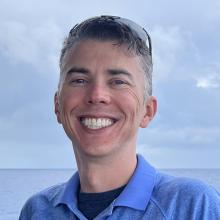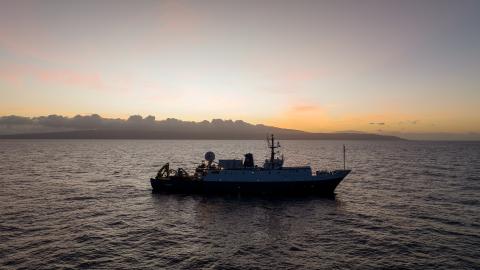
Mark Mueller
Tell us about your work/research. What kinds of things do you do?
I am a Benthic Ecologist for the Bureau of Ocean Energy Management (BOEM) in our headquarters' Office of Environmental Programs / Environmental Studies Program. BOEM is the federal agency responsible for managing energy and mineral resources on the U.S. Outer Continental Shelf. My primary subject matter expertise is deep-sea benthic (seafloor) species and habitats, including mapping, exploring, and characterizing these environments. Most of my time is spent developing and procuring multi-partner collaborative studies to collect and/or analyze deep sea environmental data--such as this expedition. Supporting such research helps advance general scientific understanding, but we also focus on making sure it translates into information useful for management needs.
In recent years I've had the privilege of helping write and implement the National Ocean Mapping, Exploration and Characterization (NOMEC) Strategy and Implementation Plan, as a co-chair of the Interagency Working Group on Ocean Exploration and Characterization. We produced a Strategic Priorities for OEC report that includes Hawai'i and other Pacific Islands as an interagency priority area.
What sparked your initial interest in your career?
Growing up in Colorado (~500 million years too late for the ocean!), my first taste for natural resource policy and management actually came from the original Yellowstone National Park Gray Wolf reintroduction project. Seeing the scientists and managers finding ways to make that controversial and complicated effort succeed and bring about the positive ecosystem-level changes helped inspire me to pursue formal education in Environmental Science and Policy. Despite growing up landlocked, I always loved the ocean so I moved to Florida for college to get that training and eventually employment with successive state, regional and federal government agencies.
Who influenced you or encouraged you the most?
I had two equally influential undergraduate professors that directly shaped my career path. One taught Environmental Policy and the other specialized in pairing field biology with Geographic Information Systems. Since I loved and couldn't decide which career path I liked better, I just kept on doing both simultaneously right through graduate school and into my career.
What element of your work/study do you think is the most fascinating?
New knowledge is always fascinating! Since so little of the deep ocean has been explored, almost every field expedition makes exciting new discoveries. Not just the headline-grabbing new species finds, but also important new ecological and geological insights that can make a big practical difference, such as locating species or habitats in unexpected places or conditions. This can directly change management measures.
I've also really enjoyed getting so involved in interagency work, facilitating better collaboration between different parts of the Executive Branch. I love the very ambitious "moonshot" type goals set in the NOMEC Strategy because they force everyone to think more creatively and work more efficiently in order to meet such big challenges.
How did you get involved with the Ocean Exploration Trust?
Through the multi-institution Ocean Exploration Cooperative Institute, of which Ocean Exploration Trust is a member. I'm the Contracting Officer's Representative for a BOEM / NOAA Interagency Agreement that's being used to co-fund this study with NOAA Ocean Exploration. We realized E/V Nautilus and its Corps of Exploration was the perfect choice for this mission. Since I was already defining and coordinating most of the federal interagency science needs and have relevant background in all of the various planned science, OET and NOAA asked me to serve as Co-Lead Scientist, along with Chris Roman from University of Rhode Island (in charge of operating the Deep Autonomous Profiler). I think we're all excited to be working together!
What other jobs led you to your current career?
Since finishing grad school in 2006, I started working on GIS and policy for manatees and North Atlantic Right Whales for the Florida Fish and Wildlife Research Institute which was a great introduction to this field. I next moved to the Gulf of Mexico Fishery Management Council where I helped the Council to manage corals and other benthic habitats important to fisheries including helping develop new deep-sea coral habitat protected areas. That expertise led me to a great job in BOEM's Gulf of Mexico Region focused on avoiding impacts from Gulf oil and gas activities before landing my current headquarters position with its national (and sometimes international) focus. I guess I've been slowly expanding my geographic focus with every position!
What are your degrees and certifications?
Bachelors in Environmental Studies (with minors in Computer Science and Creative Writing) from Eckerd College (2003); Master's in Environmental Science & Policy and Graduate Certificate in GIS from the University of South Florida (2006). OPM Leadership Education and Development Certificate (2018).
What are your hobbies?
World travel with my wife whenever possible! We just returned from Tonga and Fiji which were amazing. Sailing--I'm certified up through catamarans but still have a long way to go before I'm actually good at it. Watching my beloved Chicago Bears come really close to not losing. Learning how to do Flyball with my pup. And because I'm a proud nerd, reading and learning everything I can find the time for. That leads to regular trivia night invites!
What advice would you give someone who wants to have a career like yours?
For the particular type of government resource management work that I do, it's actually better not to be over-specialized but rather to "know a little about a lot." As a scientist, stay committed to being objective and following the scientific method wherever it may lead. Work on becoming a strong writer, and not just technical writing. Develop your "soft skills" including how to communicate and work with people from all backgrounds and viewpoints. Push your limits, it's the best way to grow.
Expeditions
Mark participated in the following Ocean Exploration Trust expeditions:

